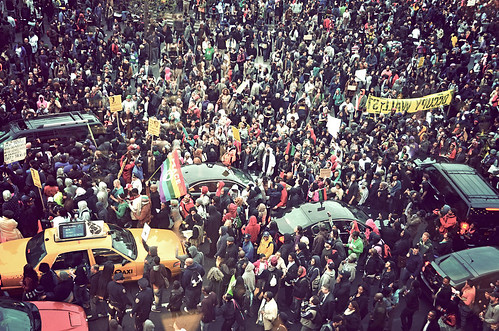"This is not about a black and white thing. This is about a wrong and right thing."
—Sybrina Fulton, Trayvon Martin's mother
Million Hoodies March, Union Square, New York. Source: Rene Carson, photos.byhandmedia.com
As our country grapples with the traumatic aftermath of the Trayvon Martin killing, we ask ourselves, can this crisis bring us together? How do we begin to address an issue as systemic as racial profiling?
Indeed, this moment has brought us together as much as divided us. We have been talking about details picked up in news articles: Why the neighborhood watchman carried a gun, Florida laws and law enforcement, and Trayvon's fear. The resonance of his death to parents across the country. There are polls and politicians, calls for justice for Trayvon and empathy for his shooter, George Zimmerman. On Facebook, people around the country are creating pages, groups and events. The Justice for Trayvon Martin page has more than 200,000 likes. The Change.org petition, “Prosecute the Killer of Our Son, 17-year-old Trayvon Martin,” has 2.2 million signatures.
Source: Rene Carson, photos.byhandmedia.com
In Manhattan, thousands attended the Million Hoodies March. People are standing up and saying, “I Am Trayvon Martin,” or “I Could Be Trayvon Martin” (and some are already “weary of ‘being Trayon.’”) On the 44th anniversary of Dr. Martin Luther King Jr.’s assassination, just a few days ago, GlobalGrind.com posted an image of Dr. King in a hoodie. Editor-in-chief Michael Skolnik writes:
“I wish [Dr. King] knew that since his death we have searched for the soul of this nation. We have begun to ask questions that have never been asked. We have challenged each other in ways that we have yet to do. We yearn for a post-racial America.”
Clearly we’re not there yet. According to one study, 86 percent of the new stories on TV that featured black men involved crime.
One of the challenges that organizations have taken up is moving this discussion from the personal narratives that intrigue us about the crime to the larger societal problems that need to be addressed, including the depictions of black men in the media.
In early April, the Robert C. Maynard Institute for Journalism Education held a panel discussion, “The Trayvon Martin Murder: How did media portrayals of black men contribute to the death of a teenager?” near our office in Oakland, CA. At the event, Maynard president Dori Maynard placed the crime in a larger context. (Read more from the Maynard Institute on media depictions of black males.)
Video: Howard University students and alumni stand against the killing of Trayvon Martin in this video, “Am I Suspicious?”
“This struck a nerve with African Americans. We all felt as if we knew this story. Whether it was Trayvon, stop and frisk, or any of the ways the criminal justice system has had a detrimental effect on our community. And that’s the story that needs to be told, and that’s not the story that’s being told right now. It really is a very personal narrative. Until we move away from the personal, I think this story is problematic,” Maynard said. “The way we have been looking at race in this story has been problematic. ‘George Zimmerman is Hispanic, so how can he be racist?’ These last few months have shown just because you are not a white male doesn’t necessarily mean you understand another community.”
That same day, the Maynard Institute started a Tumblr blog, the Faces of Black Men. The site encourages users to contribute images and stories “so we can begin to present a more accurate picture of African American boys and men.”
This is a tragedy and a crisis. But it is also an opportunity: long overdue dialogue is finally happening. We encourage local communities to work with their young people—the leaders of tomorrow—to address this systemic problem.
Update: On April 11, George Zimmerman was charged with second-degree murder in the killing of Trayvon Martin. Read more about the charges at the Florida Times-Union. Arraignment scheduled for May 29.
Read more Not In Our Town coverage of racial profiling.

